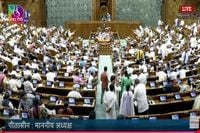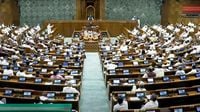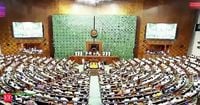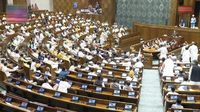The contentious Waqf (Amendment) Bill, which proposes sweeping changes in the regulation of Waqf properties and the settlement of disputes, sailed through the Lok Sabha after a midnight vote on April 2, 2025. This legislation was the result of a marathon 12-hour debate where the ruling BJP-led NDA government faced accusations from the Opposition of interfering in Muslim religious affairs, a charge that Union Home Minister Amit Shah vehemently rejected.
During the debate, Shah asserted that the government had no intention of meddling in the affairs of the Muslim community, stating, “We are not scaring the Muslims, you are scaring the Muslims. I am saying that no citizen of this country, irrespective of religion, will be harmed.” He accused the Opposition of spreading “misconceptions” and “rumours” to gain political mileage.
Shah emphasized that the proposed reforms would benefit poor Muslims and women, saying, “An illusion is being created that this Act is about interference in the religious activities of Muslim brothers and in their donated property.” He insisted that the Bill would protect land claims made by Waqf boards and prevent unauthorized declarations of land as Waqf property.
According to Shah, from 1913 to 2013, waqf boards held 18 lakh acres of land, but from 2013 to 2025, an additional 21 lakh acres had been designated as Waqf property. He questioned the rationale behind this increase, asking, “Where did the properties go? Were they sold? With whose permission?”
Opposition leaders, including Rahul Gandhi, condemned the Bill as a weapon to marginalize Muslims and infringe upon their personal laws and property rights. Gandhi stated, “This attack on the Constitution by the RSS, BJP and their allies is aimed at Muslims today but sets a precedent to target other communities in the future.”
Minority Affairs Minister Kiren Rijiju, who introduced the Bill, echoed Shah's sentiments, stating that the legislation was not aimed at interfering with religious practices. He noted that “there is no provision in this to interfere in the management of any mosque.” Rijiju further claimed that the Bill was the result of extensive consultations, involving inputs from 284 delegations and Waqf boards from 25 states and union territories.
The Waqf (Amendment) Bill aims to streamline the management of Waqf properties through technology-driven initiatives, including the automation of registration and auditing processes. It also enhances the oversight and accountability of Waqf Tribunals and boards to effectively address land disputes.
Critics, however, have raised concerns about the potential implications of these reforms. The Bill allows for the Collector to investigate the ownership of Waqf land, which some view as a means for increased state control over religious properties. Shah defended this provision, asserting that similar procedures apply to land acquisitions for temples and churches.
In a notable exchange during the debate, Rijiju responded to accusations from AIMIM Chief Asaduddin Owaisi regarding provisions for Hindus in the Waqf system, stating, “There is already a provision for the Hindus. There is no need to make another law on it.” He also challenged the opposition to clarify how the Bill is anti-Muslim and unconstitutional, questions he said they failed to answer.
As the debate continued, the opposition accused the government of bulldozing the legislation without adequate time for amendments. Congress leader Gaurav Gogoi argued that the Bill is unconstitutional and dilutes the rights of minorities, while TMC MP Kalyan Banerjee labeled it as misconceived and arbitrary.
Despite the robust opposition, the Bill passed with 288 votes in favor and 232 against, also leading to the approval of the Mussalman Wakf (Repeal) Bill, which repeals the Mussalman Wakf Act of 1923. Rijiju emphasized that the legislation is not retrospective and does not confiscate anyone’s property.
In his remarks, Shah reiterated that the government does not wish to interfere with Waqf affairs, stating, “There will be no non-Islamic members in the waqf. Understand this clearly.” He explained that non-Muslims included in Waqf councils would solely be for administrative purposes, ensuring that donations are used appropriately.
Furthermore, he criticized the UPA government for making the Waqf law “extreme” in 2013, suggesting that this led to the current need for reform. He pointed to previous instances of waqf property claims, including significant properties in Delhi, and accused the opposition of using these issues for political gain.
In a final rebuttal, Rijiju maintained that the Bill enhances the representation of women and non-Muslims in Waqf bodies, aiming for a more inclusive governance structure. He stated, “We have allowed Shia, Sunni, backward Muslims, women and expert non-Muslims to be part of the Waqf Board.”
Despite the assurances from the government, the passage of the Waqf (Amendment) Bill has sparked significant debate about the balance between property management and religious rights, with many expressing concerns over the potential for misuse and marginalization of the Muslim community.








